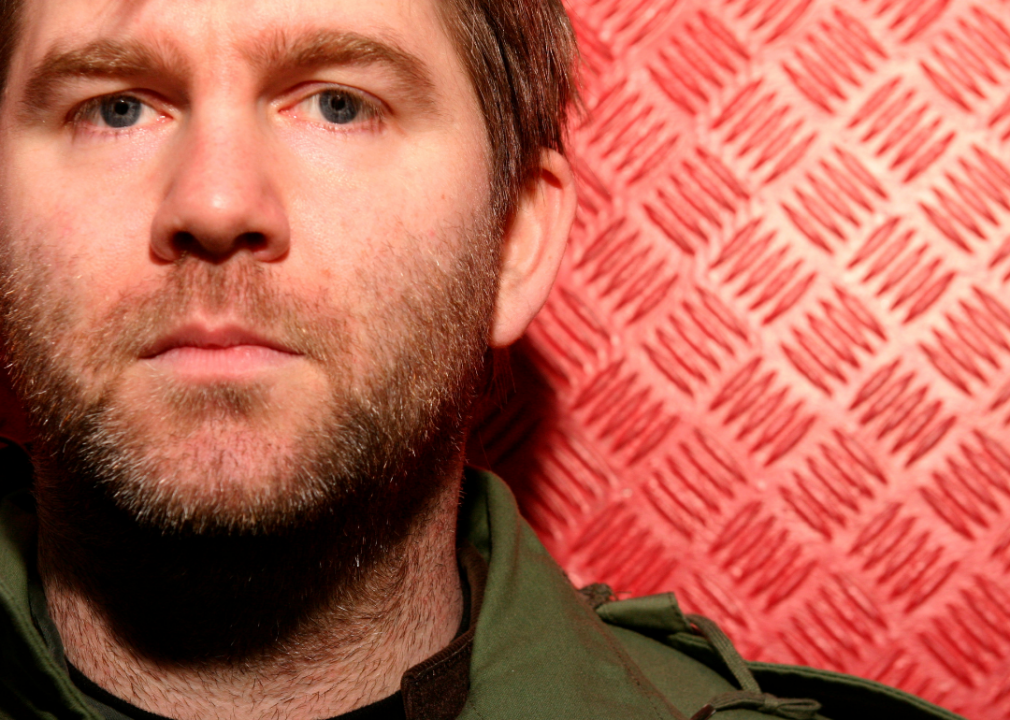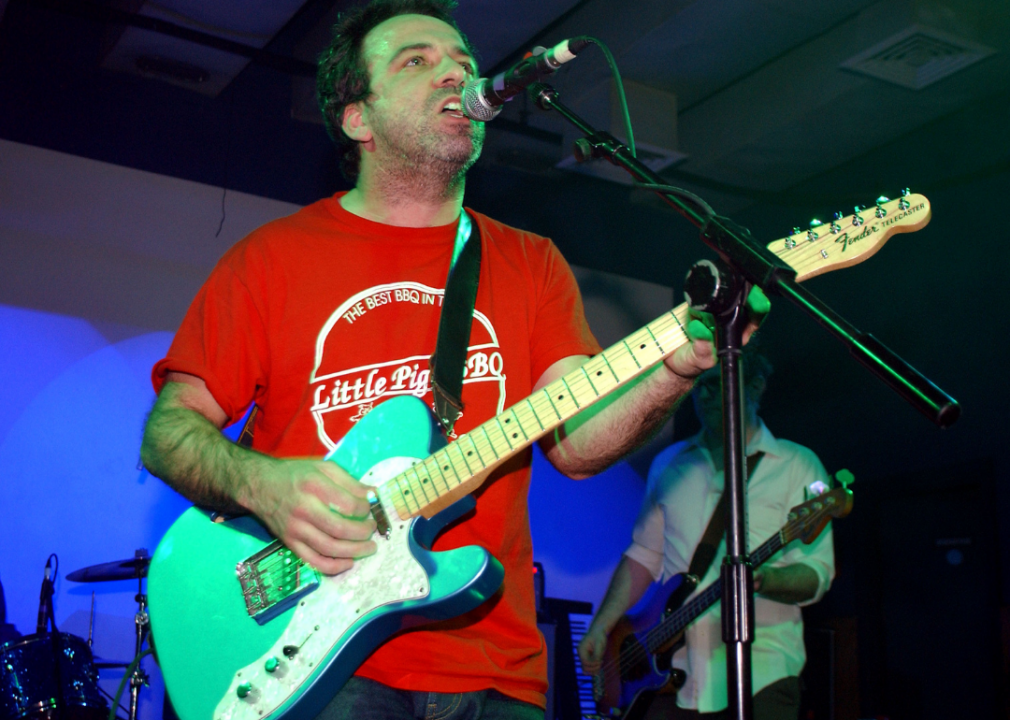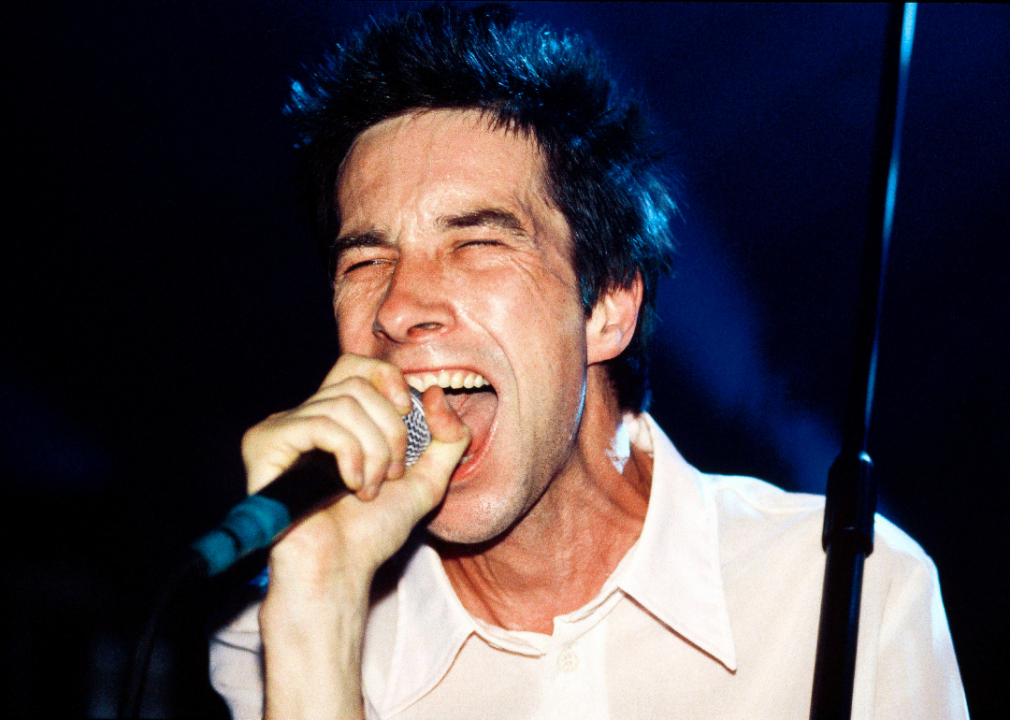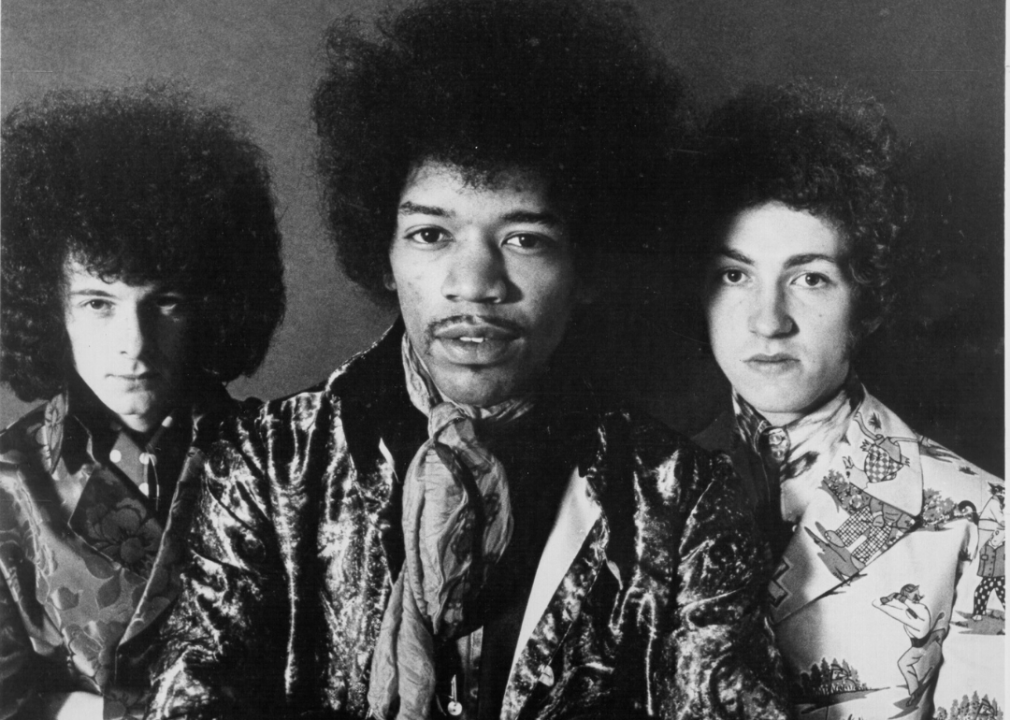By: Joni Sweet

Michael Ochs Archives // Getty Images
100 best rock albums of all time, according to critics
Driven by the success of the Byrds and the Beatles, the mid-1960s saw rock-and-roll evolve from mere dance music for youth to a bona fide form of art, according to Simon C. W. Reynolds, author of “Blissed Out: The Raptures of Rock.” The development of the genre not only helped it to be taken more seriously by music fans—it created the opportunity for critics to share their opinions on albums with the world. Enter the birth of rock criticism. Magazines like Crawdaddy! and Rolling Stone elevated rock singers to the status of “seers and sages” who capture the zeitgeist in their lyrics and melodies.
Life’s too short to spend time listening to bad music, and rock critics help listeners discover the best of the best. They act as gatekeepers, influencing what gets played on the radio (and nowadays, downloaded from streaming services), while simultaneously solidifying a musician’s “place in music history,” writes Kembrew McLeod in “One and a Half Stars: A Critique of Rock Criticism in North America.” And while critics might not always agree about a particular album, their aggregated reviews can give you a pretty good sense of the cream of the crop when it comes to music. It’s an ideal place to start if you’re looking for, say, fantastic rock albums from the last half-century.
Stacker did just that when we compiled data from Metacritic on the best rock albums of all time, ranked by Metascore. Only albums with seven or more reviews were eligible. EPs, box sets, and compilations were not considered. Due to the availability of music review data, the list is skewed toward but not limited to the last three decades. Stacker also looked at reviews and musician interviews from Rolling Stone, Spin, Drowned in Sound, Pitchfork, The Guardian, The New York Times, the Los Angeles Times, The A.V. Club, PopMatters, and Now Toronto to learn more about the albums.
Did your favorite album make the cut? Click through to see the 100 best rock albums of all time, according to the critics.
You may also like: 50 binge-worthy podcasts

Shirlaine Forrest // Getty Images
#100. ‘The Futureheads’ by The Futureheads
– Metascore: 86
– User score: 8.7
– Release date: Oct. 26, 2004
Even though The Futureheads don’t pay much attention to the typical verse-chorus-verse structure on their namesake album, it still boasts tons of irresistibly catchy songs, according to Sam Ubl of Pitchfork. Fans could play along with two songs from the album (“Hounds of Love” and “Decent Days and Nights”) through the video game Rock Band about six years after the tracks were first released.

Peter Pakvis // Getty Images
#99. ‘Feast of Wire’ by Calexico
– Metascore: 86
– User score: 8.6
– Release date: Feb. 18, 2003
The rugged, mesmerizing desert sounds of the Southwest come alive in Calexico’s “Feast of Wire.” The album draws from a diverse array of musical influences including surf-rock, jazz, mariachi, and even field recordings to create “an exceptionally broad record,” writes Eric Swedlund of The A.V. Club.

Frank Mullen // Gettty Images
#98. ‘Black Sheep Boy’ by Okkervil River
– Metascore: 86
– User score: 8.8
– Release date: April 5, 2005
Okkervil River was nearly at the point of giving up the year before they released “Black Sheep Boy.” Broke and living in a van, the indie-rock band channeled all their challenges into one last album, which was lauded by critics upon its release, according to Nina Corcoran of Consequence of Sound. Leader Will Sheff’s hyperliterary lyrics received particular praise from Kelefa Sanneh of The New York Times.

Barney Britton // Getty Images
#97. ‘We Used to Think the Freeway Sounded Like a River’ by Richmond Fontaine
– Metascore: 86
– User score: tbd
– Release date: Sept. 29, 2009
Willy Vlautin, Richmond Fontaine’s lyricist and singer, uses his skills as a novelist to paint compelling portraits on “We Used to Think the Freeway Sounded Like a River.” While the alt-country rock record isn’t necessarily a sustained masterpiece, it has flashes of brilliance, writes David Gassmann of PopMatters.

PYMCA // Getty Images
#96. ‘LCD Soundsystem’ by LCD Soundsystem
– Metascore: 86
– User score: 8.0
– Release date: Feb. 15, 2005
LCD Soundsystem earned a Grammy nomination for their debut studio album. Neumu’s Tom Ridge wrote that the record retained “its maximum coolness” with a sound that can be described as “bare wires, exposed workings, pre-dissected for maximum accessibility.”
You may also like: Movie trivia for the top 100 films of all time

Lex van Rossen/MAI // Getty Images
#95. ‘Sno Angel Like You’ by Howe Gelb
– Metascore: 86
– User score: 8.3
– Release date: March 21, 2006
Howe Gelb recruited the help of a Canadian gospel choir Voices of Praise for “‘Sno Angel Like You.” However, it’s not a gospel album—the pop-rock record is “slippery, loose…hummable” with infectious tracks and sounds of gritty, rollicking blues, per Thom Jurek of AllMusic.

Andrew Benge // Getty Images
#94. ‘Thunder, Lightning, Strike’ by The Go! Team
– Metascore: 86
– User score: 8.7
– Release date: Sept. 13, 2004
For their debut album “Thunder, Lightning, Strike,” The Go! Team captured ideas and samples on cassettes with a lo-fi four-track recorder and gave each one a “pretty trippy title,” some of which eventually named the finished track. The effect was like flipping between radio channels, helping the record take the #8 spot on Pitchfork’s list of top albums of 2004.

Nathan Shanahan // Getty Images
#93. ‘You Forgot It in People’ by Broken Social Scene
– Metascore: 86
– User score: 8.9
– Release date: June 3, 2003
Broken Social Scene recorded “endlessly replayable, perfect pop” tracks for their second studio album, according to Ryan Schreiber of Pitchfork. The album’s airy spaciousness and dense, baroque instrumentation elevate it beyond an otherwise excellent pop album, though.

James Arnold/PA Images // Getty Images
#92. ‘Rings Around The World’ by Super Furry Animals
– Metascore: 86
– User score: 8.7
– Release date: March 19, 2002
James Moore of Drowned in Sound describes Super Furry Animals’ fifth studio album as “essential,” with its dreamy, experimental, bizarre sound. The eclectic record, which incorporates everything from death metal to techno, was the first ever to be released simultaneously as both an audio album and DVD.

Gaelle Beri // Getty Images
#91. ‘The Decline of British Sea Power’ by British Sea Power
– Metascore: 86
– User score: 8.8
– Release date: Sept. 9, 2003
While the name of the debut album by British Sea Power may have set low expectations, the unconventional album earned rave reviews from critics. It boasts a “provocative, post-punk sound” with intellectual complexity and inquisitive lyrics about Czech history and Russian literature, according to Rough Trade.
You may also like: Mistakes from the 100 worst movies of all time

Fred Hayes // Getty Images
#90. ‘Quicksand / Cradlesnakes’ by Califone
– Metascore: 86
– User score: 8.8
– Release date: March 18, 2003
A mix of rock, blues, country, electronica, and folk, “Quicksand / Cradlesnakes” is the most confident album from experimental rock band Califone, according to Delusions of Adequacy. It blends futuristic sounds inspired by Brian Eno with back-porch stomps to create a “hoedown on the moon,” writes Jeff Terich of Treble.

Star Tribune // Getty Images
#89. ‘Separation Sunday’ by The Hold Steady
– Metascore: 86
– User score: 8.7
– Release date: May 3, 2005
Dubbed a “life-altering rock ’n’ roll album” by Kenneth Partridge of The A.V. Club, “Separation Sunday” is a concept record that explore’s a girl’s search for self and a higher power. The Hold Steady’s fans appreciated the album’s inside jokes and pop culture references.

Tabatha Fireman // Getty Images
#88. ‘Robyn’ by Robyn
– Metascore: 86
– User score: 8.8
– Release date: April 29, 2008
Hook-laden dance songs and synth-pop tracks earned Robyn critical acclaim for her namesake album. The record prompted Paul Taylor of the Manchester Evening News to describe the singer as “a mini-Madonna in the making.”

Jason Merritt // Getty Images
#87. ‘Mirrored’ by Battles
– Metascore: 86
– User score: 8.0
– Release date: May 22, 2007
Experimental rock group Battles departed from the style of their previous EPs, which were strictly instrumental, when they added prominent vocals to “Mirrored.” Critics loved it, with Spin magazine calling it “rock that’s both fist-pumping and forward-looking.”

ullstein bild // Getty Images
#86. ‘Comicopera’ by Robert Wyatt
– Metascore: 86
– User score: 8.6
– Release date: Oct. 9, 2007
Robert Wyatt collaborated with a number of other musicians including Brian Eno, Phil Manzanera, and Paul Weller on his 2007 album “Comicopera.” The experimental rock record has a three-act structure that starts with the personal, progresses to the resolutely political, and concludes with a protest, per Joshua Klein of Pitchfork.
You may also like: 100 best Westerns of all time

Tim Mosenfelder // Getty Images
#85. ‘Sound of Silver’ by LCD Soundsystem
– Metascore: 86
– User score: 8.6
– Release date: March 20, 2007
“Sound of Silver” delivers a devastating emotional punch, with Dorian Lynskey of The Guardian describing the album as “dance-rock for grownups.” It earned a Grammy nomination for Best Electronic/Dance Album.

Frank Mullen // Getty Images
#84. ‘Mass Romantic’ by The New Pornographers
– Metascore: 87
– User score: 8.8
– Release date: Nov. 21, 2000
Indie rock finds its power pop side on The New Pornographers’ “Mass Romantic,” according to Tim DiGravina of AllMusic. The album features catchy vocals and a diverse musical palette influenced by everyone from The Beatles and David Bowie to T. Rex and Todd Rundgren.

Tabatha Fireman // Getty Images
#83. ‘Phantom Power’ by Super Furry Animals
– Metascore: 87
– User score: 8.9
– Release date: July 22, 2003
Super Furry Animals tried their hand at engineering their own music for the first time ever on “Phantom Power.” The result is a more relaxed sound that made for what some critics touted as the band’s best album to date, according to Matt Walton of the BBC.

Lex van Rossen/MAI // Getty Images
#82. ‘Seven Swans’ by Sufjan Stevens
– Metascore: 87
– User score: 8.7
– Release date: March 16, 2004
Folk rocker Sufjan Stevens explored the theme of Christian spirituality in “Seven Swans.” The album is deeply sincere and features lots of banjo, according to Nick Sylvester of Pitchfork.

Bill Tompkins // Getty Images
#81. ‘Children Running Through’ by Patty Griffin
– Metascore: 87
– User score: 8.6
– Release date: Feb. 6, 2007
Patty Griffin’s voice soars on the gospel-tinged tracks of “Children Running Through,” writes Scott Mervis of the Pittsburgh Post-Gazette. It features both power-strummed acoustic tracks and ballads, including a song about a trapeze artist that features Emmylou Harris.
You may also like: Best ‘Simpsons’ episodes of all time

Wendy Redfern // Getty Images
#80. ‘The Creek Drank the Cradle’ by Iron & Wine
– Metascore: 87
– User score: 8.7
– Release date: Sept. 24, 2002
Sam Beam, the artist behind Iron & Wine, intended to pass along demos of songs he recorded at home to Calexico for rhythm work. Instead, they ended up on “The Creek Drank the Cradle,” which Tim Perlich of Now Toronto calls “the greatest thing he’s ever done.”

Gary Wolstenholme // Getty Images
#79. ‘Favourite Colours’ by The Sadies
– Metascore: 87
– User score: 8.6
– Release date: Aug. 24, 2004
The Sadies strike a balance of their diverse interests, which include surf, garage, and country, on “Favourite Colours,” according to Joe Tangari of Pitchfork. He went on to call the album “stylistically and sonically brilliant.”

The Boston Globe // Getty Images
#78. ‘Yankee Hotel Foxtrot’ by Wilco
– Metascore: 87
– User score: 8.9
– Release date: April 23, 2002
After Wilco’s record label refused to release “Yankee Hotel Foxtrot,” the band decided to stream it for free through their website. It was officially released the following year, with Brent S. Sirota of Pitchfork calling it a “masterpiece.”

Gus Stewart // Getty Images
#77. ‘Neon Bible’ by Arcade Fire
– Metascore: 87
– User score: 8.8
– Release date: March 6, 2007
The Arcade Fire built upon the success of their first album with their second release, “Neon Bible,” in 2007. They recorded it out of the spotlight at a church in Canada, according to Josh Modell of The A.V. Club. It features sharp lyrics and “triumphant melodies.”

LeglessGoat // Wikimedia Commons
#76. ‘Gala Mill’ by The Drones
– Metascore: 87
– User score: 8.3
– Release date: Sept. 2, 2006
While The Drones stayed true to their characteristic punk-blues style, the band also dabbled in folk rock for their album “Gala Mill.” The lyrics on the record explore Australia’s colonial history, with a narrator (a prisoner) on one track telling the story of his arrival from Ireland and ratting out a couple of guys on his chain gang for their plan to murder someone, according to Brandon Stosuy of Pitchfork.
You may also like: Best ‘Family Guy’ episodes

J. P. Aussenard // Getty Images
#75. ‘Ágætis Byrjun’ by Sigur Rós
– Metascore: 87
– User score: 8.9
– Release date: May 15, 2001
The lush orchestration and cello-bowed guitar work on “Ágætis Byrjun” helped propel Icelandic post-rock group Sigur Rós to international acclaim, writes Zack Ruskin of SF Weekly. Songs from the album make frequent appearances on soundtracks for movies including “Vanilla Sky” and “The Life Aquatic with Steve Zissou.”

ANGELA WEISS // Getty Images
#74. ‘xx’ by The xx
– Metascore: 87
– User score: 8.8
– Release date: Oct. 6, 2009
“xx” features melancholic songs that draw inspiration from R&B, post-punk, alternative rock, and electronica. While the album did not immediately climb the charts, it went on to become hugely influential in the indie-rock scene after it won the Mercury Prize in 2010. Other musicians, including Shakira and Damon Albarn, covered songs from the record, according to Jude Rogers of the New Statesman.

Staff // Getty Images
#73. ‘Franz Ferdinand’ by Franz Ferdinand
– Metascore: 87
– User score: 8.6
– Release date: March 9, 2004
Winner of the 2004 Mercury Prize, Franz Ferdinand’s eponymous debut album was deemed “a masterpiece of funky, punky, suave cool from the first track to the last” by Simon Fernand of the BBC. In addition to receiving critical acclaim, the album also enjoyed commercial success and was certified platinum by the RIAA.

Gary Wolstenholme // Getty Images
#72. ‘A Feather in the Engine’ by David Kilgour
– Metascore: 87
– User score: data not available
– Release date: Jan. 29, 2002
David Kilgour balances intricately composed tracks with more abstract, freer sounds on “A Feather in the Engine,” says Joe Tangari of Pitchfork. He particularly praised the album for its beauty, which makes listeners hardly feel time pass while they’re listening.

Gary Wolstenholme // Getty Images
#71. ‘Let’s Stay Friends’ by Les Savy Fav
– Metascore: 87
– User score: 8.2
– Release date: Sept. 18, 2007
Gamers may recognize the song “Raging in the Plague Age” from this album, which was featured in Grand Theft Auto IV. But more than a contributor to a video game soundtrack, “A Feather in the Engine” is an album that rivals the energy and excitement of Les Savy Fav’s live shows, making it a real treat for fans, reports Rosie Swash of The Guardian.
You may also like: 50 classic movies turning 50 in 2020 you can catch up on

PYMCA // Getty Images
#70. ‘And Their Refinement of the Decline’ by Stars Of The Lid
– Metascore: 87
– User score: 7.3
– Release date: April 7, 2007
Stars of the Lid didn’t expect “And Their Refinement of the Decline” to achieve the same levels of success as their previous album, believing that the iPod would kill sales. However, it ended up outselling “The Tired Sounds of the Stars of the Lid,” the band told Rolling Stone. Interestingly, the duo behind the band were often not in the same room together when they recorded the record.

Three Gut Records
#69. ‘Now, More Than Ever’ by Jim Guthrie
– Metascore: 87
– User score: 8.7
– Release date: June 1, 2004
Jim Guthrie displayed leaps in his songcraft when he released “Now, More Than Ever,” according to Sean Carruthers of AllMusic. He credits the advancement to Guthrie’s inclusion of multiple musicians on the songs, as well as a string section.

Jordi Vidal // Getty Images
#68. ‘Things We Lost In The Fire’ by Low
– Metascore: 87
– User score: 8.8
– Release date: Feb. 6, 2001
Low pushed the boundaries of their characteristically pretty and deliberately paced sound on “Things We Lost in the Fire,” indicating a level of maturity for the band, writes Stephen Thompson of The A.V. Club. It infuses tracks with a mix of infectious pop, guitar fuzz, and fuller instrumentation.

Robin Little // Getty Images
#67. ‘World Without Tears’ by Lucinda Williams
– Metascore: 87
– User score: 8.9
– Release date: April 8, 2003
Singer-songwriter Lucinda Williams’ seventh studio album, “World Without Tears,” reflected changes in her life, particularly her move to Los Angeles from Nashville. Its songs are “noisier and randier” compared with those on her previous album, writes Will Hermes of Entertainment Weekly.

Greg Neate // Wikimedia Commons
#66. ‘Cold House’ by Hood
– Metascore: 87
– User score: 8.3
– Release date: Nov. 13, 2001
Hood made significant progress from their earlier experimental post-industrial beats and irreverently remixed songs on their fifth studio album, “Cold House,” writes Phillip Sherburne of Cleveland Scene. The album combines folky indie rock with experimental electronica for a deeply melancholic album.
You may also like: Lyrics to 50 famously misunderstood songs, explained

Tim Jackson // Getty Images
#65. ‘The Town And The City’ by Los Lobos
– Metascore: 87
– User score: 8.6
– Release date: Sept. 12, 2006
Los Lobos looked to Jack Kerouac’s debut novel for the title of their 12th studio album. It explores the experience of Mexican American immigration, touching on themes like loneliness and longing.

Paul Natkin // Getty Images
#64. ‘Workbook’ by Bob Mould
– Metascore: 87
– User score: 8.4
– Release date: April 1989
A year after rock band Hüsker Dü broke up, guitarist and vocalist Bob Mould set out as a solo act and released his debut album “Workbook.” Folk is the dominant genre of the tracks on this record, but Mould also includes occasional heavy guitar riffs.

Chris McKay // Getty Images
#63. ‘The Dirty South’ by Drive-By Truckers
– Metascore: 87
– User score: 8.8
– Release date: Aug. 24, 2004
Southern rock band Drive-By Truckers explore the complexities of Southern culture and dispel the myths of some of the region’s best-known figures in “The Dirty South.” Amid a “resurgence of Southern rock,” the band offered a deeper, more introspective take on the genre, ultimately turning the record into the “homemade roadside memorial” of human tragedies, reports Stephen M. Deusner of Pitchfork.

Jemal Countess // Getty Images
#62. ‘Dig!!! Lazarus Dig!!!’ by Nick Cave & the Bad Seeds
– Metascore: 87
– User score: 8.7
– Release date: April 8, 2008
Recorded in an impressively short five days, “Dig!! Lazarus Dig!!” is Nick Cave & the Bad Seeds’ last album to include Mick Harvey, a founding member of the band. Stephen M. Deusner of Pitchfork said of the album, “This is how rock musicians are supposed to age.” The record is steeped in Americana.

Jeff Kravitz // Getty Images
#61. ‘Decoration Day’ by Drive-By Truckers
– Metascore: 87
– User score: 8.7
– Release date: June 17, 2003
“Decoration Day” lived up to the anticipation the Drive-By Truckers built after the success of their previous album, “Southern Rock Opera.” But while that record featured heavier Southern rock, “Decoration Day” took a more mellow, bare approach.
You may also like: 30 stars who hit their stride late in life

Lindsay Brice // Getty Images
#60. ‘The Argument’ by Fugazi
– Metascore: 87
– User score: 8.7
– Release date: Oct. 16, 2001
Post-hardcore group Fugazi went out with a bang with their last studio album (to date), “The Argument,” released in 2001. It still had the art-punk vibe of the group’s previous albums but also began incorporating strings and piano for a different sound, per Chris True of AllMusic.

digboston // Wikimedia Commons
#59. ‘Person Pitch’ by Panda Bear
– Metascore: 87
– User score: 8.7
– Release date: March 20, 2007
Panda Bear (the alias for artist Noah Lennox) manipulated a mix of samples and loops, along with layered vocals, to create his third solo album, “Person Pitch.” The record captures the sunshine of the artist’s adopted home in Lisbon, Portugal, and proves both “overwhelming and inspirational,” according to Mark Richardson of Pitchfork.

Gina Wetzler // Getty Images
#58. ‘Blue Record’ by Baroness
– Metascore: 87
– User score: 8.7
– Release date: Oct. 13, 2009
“Blue Record” is considered by LA Weekly to be among the greatest metal albums ever. The 44-minute record features songs that bleed into one another with a mix of acoustic interludes and interwoven lyrics, according to Grayson Currin of Pitchfork. It’s a companion album to Baroness’s previous record, “Red Album.”

Graham Denholm // Getty Images
#57. ‘Fleet Foxes’ by Fleet Foxes
– Metascore: 87
– User score: 8.8
– Release date: June 3, 2008
David Simpson hailed the Fleet Foxes’ eponymous debut studio record as “a landmark in American music.” The heavily nature-infused record touches on surf rock and English folk.

Kill Rock Stars
#56. ‘Leaves Turn Inside You’ by Unwound
– Metascore: 87
– User score: 8.6
– Release date: April 17, 2001
On “Leaves Turn Inside You,” Unwound continued the musical path they started on two of their earlier albums, “Challenge for a Civilized Society” and “Repetition.” The band used a Mellotron, an electronic-mechanical instrument that can produce sounds of orchestral instruments, to give the record a distinctive sound.
You may also like: 111 monumental movies from film history and why you need to see them

Michael Putland // Getty Images
#55. ‘Pacific Ocean Blue’ by Dennis Wilson
– Metascore: 87
– User score: 8.8
– Release date: Aug. 22, 1977
Dennis Wilson went solo with “Pacific Ocean Blue,” selling more copies than other Beach Boys’ albums that were released around the same time, according to Bob Mehr of American Way. It had a harder, more progressive sound than what his band was producing.

Andy Sheppard // Getty Images
#54. ‘For Emma, Forever Ago’ by Bon Iver
– Metascore: 88
– User score: 8.9
– Release date: Feb. 19, 2008
Indie folk group Bon Iver released their debut album, “For Emma, Forever Ago,” after singer-songwriter Justin Vernon decided to take a solo retreat to his dad’s hunting cabin in a remote area of Wisconsin, where the tracks were recorded. The tracks feature natural imagery and gentle acoustic strums reminiscent of the setting the musician spent creating them, according to Stephen M. Deusner of Pitchfork.

Dimitri Hakke // Getty Images
#53. ‘Exit’ by Shugo Tokumaru
– Metascore: 88
– User score: 8.7
– Release date: Sept. 2, 2008
On “Exit,” musician Shugo Tokumaru used more than 50 instruments, mostly in a major key, according to Matthew Shaer of The Boston Globe. He described it as “a symphony of found noise,” with Tokumaru pointing to old Beatles tapes as his source material.

FABRICE COFFRINI // Getty Images
#52. ‘I Am a Bird Now’ by Antony and the Johnsons
– Metascore: 88
– User score: 8.3
– Release date: Feb. 1, 2005
Devandra Banhart, Lou Reed, and Boy George all make guest appearances on “I Am a Bird Now,” the second album from Antony and the Johnsons. The album explores themes of sexual identity, disease, and love, writes Anthony Gibbons of Drowned in Sound.

ullstein bild // Getty Images
#51. ‘Abattoir Blues / The Lyre Of Orpheus’ by Nick Cave & the Bad Seeds
– Metascore: 88
– User score: 8.8
– Release date: Oct. 26, 2004
Spanning two discs, the 13th album from Nick Cave & the Bad Seeds is “full of wonderment” and joy, according to Playlouder. It was the first record the group created without longtime member Blixa Bargeld, who had been replaced by James Johnston.
You may also like: 50 of the best ‘SNL’ skits

The Washington Post // Getty Images
#50. ‘Monoliths & Dimensions’ by Sunn O)))
– Metascore: 88
– User score: 6.8
– Release date: May 26, 2009
Sunn O))) told Metal Underground that “Monoliths & Dimensions” was their most musical and most powerful record yet. The album works as both art and an exciting experience, with John Doran of Drowned in Sound calling it “easily the best album that has come out this year.”

C Flanigan // Getty Images
#49. ‘Kill The Moonlight’ by Spoon
– Metascore: 88
– User score: 8.8
– Release date: Aug. 20, 2002
Spoon stripped down their sound to highlight individual instruments like pianos and tambourines on their fourth album, “Kill the Moonlight.” Jakob Dorof of Tiny Mix Tapes referred to it as the band’s “magnum opus.”

Bob Berg // Getty Images
#48. ‘The Woods’ by Sleater-Kinney
– Metascore: 88
– User score: 8.4
– Release date: May 24, 2005
Sleater-Kinney “tell a feminist fairy tale” on their seventh studio album, “The Woods,” according to Rolling Stone. The album melds together 1970s-style metal music with the indie-rock sounds that were popular in the ‘90s.

Leon Neal // Getty Images
#47. ‘In Rainbows’ by Radiohead
– Metascore: 88
– User score: 9.0
– Release date: Oct. 10, 2007
Lacking major-label representation, Radiohead made headlines when they released “In Rainbows,” their seventh studio album, to fans on a pay-what-you-want basis. The experimental digital download had high rates of piracy, even though you could get it for free, according to Eric Garland of NPR.

Martyn Goodacre // Getty Images
#46. ‘From a Basement on the Hill’ by Elliott Smith
– Metascore: 88
– User score: 8.9
– Release date: Oct. 19, 2004
Elliott Smith’s sixth studio album, “From a Basement on the Hill,” was released after his death in 2003. It contains tracks the artist recorded starting in 2000, many of which explore Smith’s struggles with substance abuse and mental health issues.
You may also like: Primetime TV shows that have stood the test of time

C Brandon // Getty Images
#45. ‘Rejoicing in the Hands’ by Devendra Banhart
– Metascore: 88
– User score: 8.4
– Release date: May 4, 2004
Devandra Banhard recorded the lo-fi tracks of “Rejoicing in the Hands” in the living room of his recording engineer, Lynn Bridges. Logo magazine said of the album: “It’s as simple…[and] as striking as songwriting can get.”

Paul Bergen // Getty Images
#44. ‘Where Shall You Take Me?’ by Damien Jurado
– Metascore: 88
– User score: 8.4
– Release date: March 18, 2003
Damian Jurado tamed his sparkly indie pop sound into “a more organic ethos” rooted in the heartland on his fifth studio album “Where Shall You Take Me?,” writes Sarah Liss of Now Toronto. The album celebrates Jurado’s powerful voice and authentically crafted tunes.

Burak Cingi // Getty Images
#43. ‘Destroyer’s Rubies’ by Destroyer
– Metascore: 88
– User score: 8.0
– Release date: Feb. 21, 2006
“Destroyer’s Rubies” was designed to resemble a band performing in a room—a strikingly different sound from Destroyer’s earlier release, “Kaputt,” per Thomas Hannan of The Line of Best Fit. It features dense lyrics and a guitar-focused sound, according to Metacritic.

Lex van Rossen/MAI // Getty Images
#42. ‘Stories from the City, Stories from the Sea’ by PJ Harvey
– Metascore: 88
– User score: 8.8
– Release date: Oct. 24, 2000
English alt-rocker PJ Harvey’s fifth studio album is like a love letter to New York City, where she spent time shooting a movie in 1998, according to Sal Cinquemani of Slant Magazine. It contains at least 10 references to attractions in the Big Apple, including different boroughs, buildings, and bridges.

Brigitte Engl // Getty Images
#41. ‘Return to Cookie Mountain’ by TV on the Radio
– Metascore: 88
– User score: 8.1
– Release date: Sept. 12, 2006
A number of notable guests including David Bowie, Celebration’s Katrina Ford, and Blonde Redhead’s Kazu Makino make appearances on TV on the Radio’s second studio album, “Return to Cookie Mountain.” Brian Josephs of SPIN called the record a jewel within the band’s catalog.
You may also like: Gender disparity among film critics

Skip Bolen // Getty Images
#40. ‘Dear Science,’ by TV on the Radio
– Metascore: 88
– User score: 8.9
– Release date: Sept. 23, 2008
Brooklyn-based TV on the Radio’s third album was called “a vivid, angry, sensual soundtrack to the haunted life” by the Los Angeles Times. It features both a smart take on pop and deeply layered sounds.

Hal Horowitz // Getty Images
#39. ‘Ta Det Lugnt’ by Dungen
– Metascore: 88
– User score: 8.6
– Release date: June 21, 2004
Swedish for “Take it Easy,” “Ta Det Lugnt” is psych-rock group Dungen’s third album. Pitchfork’s Brandon Stosuy called the record “consistently mind-blowing and aesthetically far-reaching.” The album helped give the group staying power.

Hiroyuki Ito // Getty Images
#38. ’69 Love Songs’ by Magnetic Fields
– Metascore: 88
– User score: 8.8
– Release date: Sept. 7, 1999
The title of the Magnetic Fields’ sixth studio album describes exactly what it contains: 69 love songs divided into three volumes. Frontman Stephin Merritt drew inspiration for the album from “114 Songs” by Charles Ives, as well as Stephen Sondheim’s music.

Load Records
#37. ‘Hypermagic Mountain’ by Lightning Bolt
– Metascore: 88
– User score: 6.6
– Release date: Oct. 18, 2005
Lightning Bolt one-upped their 2003 release, “Wonderful Rainbow,” with “Hypermagic Mountain” two years later, per Aaron Richter of Prefix magazine. He added that the album’s combination of diverse moods with heavy rock was evidence that the band was more “than just a giant sound.”

abatha Fireman // Getty Images
#36. ‘Yours, Mine & Ours’ by Pernice Brothers
– Metascore: 88
– User score: 8.4
– Release date: May 20, 2003
“Yours, Mine & Ours” features calm, soothing songs that lend themselves to casual summertime cruising, according to Amanda Petrusich of Pitchfork. The opening track, “The Weakest Shade of Blue,” was featured in a Sherwin-Williams ad.
You may also like: 100 best movies of all time

Brian Rasic // Getty Images
#35. ‘Superunknown’ by Soundgarden
– Metascore: 89
– User score: 8.7
– Release date: March 8, 1994
Soundgarden decided to work with a new producer (Michael Beinhorn) for their fourth studio record, “Superunknown,” which would become their breakthrough and debut at the top spot on the Billboard 200. Frontman Chris Cornell told Dave Thompson of the Alternative Press that band members had a lot more freedom on this album compared to previous releases, which only included songs that everyone in the group liked.

Victoria Morse // Wikimedia Commons
#34. ‘I Was Trying to Describe You to Someone’ by Crime in Stereo
– Metascore: 89
– User score: 7.4
– Release date: Feb. 23, 2010
Long Island-based hardcore band Crime in Stereo combines corrosive anthems with effect pedals and reverberating vocals, according to the Alternative Press. The album marked an evolution from the band’s previous record, “Is Dead,” and contained more mature tracks, per a review from Delusions of Adequacy.

Gie Knaeps // Getty Images
#33. ‘Songs for the Deaf’ by Queens of the Stone Age
– Metascore: 89
– User score: 8.9
– Release date: Aug. 27, 2002
“Songs for the Deaf” takes listeners on a 14-song road trip from traffic-heavy Los Angeles to serene Joshua Tree, writes Albert Mudrian of TheFade.net, a Queens of the Stone Age website. The album became the first from Queens of the Stone Age to be certified gold in the U.S.

Jeff Kravitz // Getty Images
#32. ‘Merriweather Post Pavilion’ by Animal Collective
– Metascore: 89
– User score: 8.5
– Release date: Jan. 20, 2009
Animal Collective sought privacy for the recording of their eight studio album, so they headed to Mississippi’s Sweet Tea Recording Studio for the sessions. While there, they experimented with unorthodox recording techniques, like outfitting the control room with PA systems, to try to give “Merriweather Post Pavilion” a sound akin to their live shows, according to Tom Doyle of Sound on Sound.

Alberto E. Rodriguez // Getty Images
#31. ‘Fed’ by Plush
– Metascore: 89
– User score: 7.5
– Release date: Aug. 25, 2008
Plush’s second album, “Fed,” was released in Japan six years before it came to the West. Betty Clarke of The Guardian called the album “a symphony of Burt Bacharach-inspired pop, blaxploitation-influenced soul, and timeless balladeering.”
You may also like: Most influential celebrities on social media

C Brandon // Getty Images
#30. ‘Bachelor No. 2 or, the Last Remains of the Dodo’ by Aimee Mann
– Metascore: 89
– User score: 8.6
– Release date: May 2, 2000
Without help from a record company, singer-songwriter Aimee Mann dropped her third studio album exclusively on her website in May 2000. It was among the first records to achieve sales success solely through the internet, according to Ben Cramer of Playboy. Much of the material from “Bachelor No. 2” also appeared on the soundtrack for the film “Magnolia.”

Gie Knaeps // Getty Images
#29. ‘Nevermind’ by Nirvana
– Metascore: 89
– User score: 8.9
– Release date: Sept. 24, 1991
The epochal “Nevermind” contains some of Nirvana’s most famous tracks, such as its lead single, “Smells Like Teen Spirit,” as well as “Come as You Are.” It was the first album to include drummer Dave Grohl. The record is also known for its cover: a naked baby swimming toward a fishing hook dangling a dollar bill.

David LEFRANC // Getty Images
#28. ‘HoboSapiens’ by John Cale
– Metascore: 89
– User score: 8.2
– Release date: Sept. 7, 2004
In the seven years before recording “HoboSapiens,” John Cale spent time working on a range of other projects, from writing a ballet and classical pieces to doing film scores. He told Jay Ruttenberg of Time Out New York that the extracurricular work helped him speed up the writing process and leverage new recording techniques, ultimately giving the album a polished, slick feel.

Carolyn Cole // Getty Images
#27. ‘Modern Times’ by Bob Dylan
– Metascore: 89
– User score: 8.5
– Release date: Aug. 29, 2006
Bob Dylan’s 32nd studio album, “Modern Times,” was his first chart-topping record in the U.S. since he released “Desire” 30 years before. The success of the album helped the 65-year-old become the oldest person in U.S. history to go straight to the top of the Billboard chart, per NME.

Gary Wolstenholme // Getty Images
#26. ‘Neon Golden’ by The Notwist
– Metascore: 89
– User score: 8.8
– Release date: Feb. 25, 2003
“Neon Golden” was a breakthrough album for German indie rockers The Notwist. The moody rock record incorporates glitchy electronica to create different textures, according to Metacritic.
You may also like: 100 best John Wayne movies

Kevin Mazur // Getty Images
#25. ‘Z’ by My Morning Jacket
– Metascore: 90
– User score: 8.3
– Release date: Oct. 4, 2005
Psych-rock group My Morning Jacket leaned heavily on the synthesizer to create the spacy sounds on their fourth studio album, “Z.” The evolution in the band’s signature sound reflects a change in membership at the time—drummer Patrick Hallahan had just joined the band, and keyboardist Danny Cash and guitarist Johnny Quaid had also been recently replaced, according to Margaret Wappler of the Los Angeles Times.

Tabatha Fireman // Getty Images
#24. ‘XTRMNTR’ by Primal Scream
– Metascore: 90
– User score: 8.7
– Release date: May 2, 2000
Pronounced “Exterminator,” this album was an early attempt by Primal Scream at taking a political stance, with harsh criticism directed at the government, police, and capitalism. The record features an aggressive sound inspired by industrial music.

Jeff Kravitz // Getty Images
#23. ‘In Utero’ by Nirvana
– Metascore: 90
– User score: 8.9
– Release date: Sept. 21, 1993
Nirvana diverged from the polished production of earlier records and went for a rawer sound in their last studio album, “In Utero.” Entertainment Weekly’s David Browne described it as “mesmerizing, cathartic rock-and-roll.”

Wendy Redfern // Getty Images
#22. ‘Funeral’ by Arcade Fire
– Metascore: 90
– User score: 8.9
– Release date: Sept. 14, 2004
Dramatic and edgy, “Funeral” was praised for its original sound and sincerity by David Moore of Pitchfork. The album landed on more than a dozen “best of” lists from publications like Spin, Paste, and Rolling Stone.

Frazer Harrison // Getty Images
#21. ‘Alice’ by Tom Waits
– Metascore: 90
– User score: 8.5
– Release date: May 7, 2002
Some songs on “Alice” were already well-known to fans before its official release in 2002. Bootleg versions were sold after a briefcase of recordings were stolen from Tom Waits’ car, according to an interview he did with Keith Phipps of The A.V. Club. The official version still earned critical acclaim and, by 2006, was certified “diamond” by the Impala European Music Sales Awards.
You may also like: Fan campaigns that saved TV shows from cancellation

Hayley Madden // Getty Images
#20. ‘Illinois’ by Sufjan Stevens
– Metascore: 90
– User score: 8.9
– Release date: July 5, 2005
While produced in New York City, “Illinois” chronicles the namesake state and its culture, geography, history, and art that singer-songwriter Sufjan Stevens learned about through research. Its lyrical depth and complex orchestrations helped make it Stevens’ first album to land on the Billboard 200.

J. Vespa // Getty Images
#19. ‘Is This It?’ by The Strokes
– Metascore: 91
– User score: 9.0
– Release date: Oct. 9, 2001
The Strokes made a splash with the melodic rock and twin-guitar interplay on debut album “Is This It?” in 2001. Its cover art, featuring a latex-gloved hand on someone’s naked bottom, sparked controversy when it hit retail shelves in the U.K. and was replaced with more abstract imagery before it was released in the U.S., per Wook Kim of TIME.

Michael Ochs Archives // Getty Images
#18. ‘Raw Power’ by Iggy & the Stooges
– Metascore: 92
– User score: 8.8
– Release date: Feb. 7, 1973
“Raw Power” has earned astronomical cult appreciation since its release in 1973, according to Jonathan Hatchman of DIY Magazine. The record, which features eight songs co-written by Iggy Pop and James Williamson, plays with a mix of jazz and proto-punk rock and creates a sound that continues to feel fresh.

Yui Mok/PA Images // Getty Images
#17. ‘Elephant’ by The White Stripes
– Metascore: 92
– User score: 8.6
– Release date: April 1, 2003
After gaining momentum from their previously three albums, The White Stripes finally hit legendary status with the album “Elephant.” David Frick of Rolling Stone called it “a work of pulverizing perfection.” The album’s first song, “Seven Nation Army” earned the rock duo a Grammy.

Joe Corrigan // Getty Images
#16. ‘Lost in the Sound of Separation’ by Underoath
– Metascore: 92
– User score: 7.1
– Release date: Sept. 2, 2008
“Lost in Sound of Separation” is known as much for its powerful, passionate heavy music as its artwork. The deluxe edition received a nomination for the Dove Award for best recorded music packaging in 2010, according to The Christian Post.
You may also like: The richest country music stars

Martyn Goodacre // Getty Images
#15. ‘Brighten the Corners’ by Pavement
– Metascore: 92
– User score: 8.7
– Release date: Feb. 11, 1997
“Brighten the Corners” brims with mysterious, abstract lyrics but also a fully realized focus, writes Nathan Brackett of Rolling Stone. All five members of Pavement were together to record the album—a first for the band.

Rob Verhorst // Getty Images
#14. ‘Achtung Baby’ by U2
– Metascore: 93
– User score: 8.7
– Release date: Nov. 18, 1991
Three years after receiving harsh criticism for their album “Rattle and Hum,” U2 turned things around with “Achtung Baby.” The Irish rock band’s seventh studio album is still among their most successful, debuting at the top spot on the Billboard 200. It also earned the band a Grammy for “Best Rock Performance by a Duo or Group with Vocal.”

Richard E. Aaron // Getty Images
#13. ‘The Name of this Band Is Talking Heads’ by Talking Heads
– Metascore: 93
– User score: 8.9
– Release date: March 24, 1982
“The Name of this Band Is Talking Heads” contains live recordings of some of the most popular tracks from Talking Heads’ first four studio albums. The name of the album works to emphasize the band’s preference to have its name written without a definite article (“Talking Heads” as opposed to “the Talking Heads”).

ullstein bild // Getty Images
#12. ‘Love And Theft’ by Bob Dylan
– Metascore: 93
– User score: 8.7
– Release date: Sept. 11, 2001
Bob Dylan capped a successful late-career comeback with the release of “Love And Theft” in 2001, considered the musician’s best album in two decades, per Michael Gallucci of Ultimate Classic Rock. While heavily blues-influenced, the album features elements of jazz, rock, folk, and R&B.

Richard E. Aaron // Getty Images
#11. ‘Some Girls’ by The Rolling Stones
– Metascore: 93
– User score: 8.1
– Release date: June 9, 1978
Billboard’s Chuck Arnold has called “Some Girls” the last perfect album from The Rolling Stones. It ended the band’s creative slump, went to the top of the Billboard 200, and earned a Grammy nomination for Album of the Year.
You may also like: Mistakes from the 50 best movies of all time

Michael Ochs Archives // Getty Images
#10. ‘Led Zeppelin II’ by Led Zeppelin
– Metascore: 95
– User score: 8.9
– Release date: Oct. 16, 1968
Some of Led Zeppelin’s most beloved songs, including “Ramble On” and “Whole Lotta Love,” appeared on the band’s second studio album. Even though the album had “staggering local sales,” its hard sound made it unsuitable for radio play, per Ritchie York of Billboard.

Sophie Bassouls // Getty Images
#9. ‘Histoire de Melody Nelson’ by Serge Gainsbourg
– Metascore: 96
– User score: 8.7
– Release date: March 24, 2009
Serge Gainsbourg defied genres with his album “Histoire de Melody Nelson,” which has a soundworld “like nothing else in rock,” according to Tom Ewing of Pitchfork. It went on to influence a variety of other bands, including Portishead, Beck, Faith No More, and the Arctic Monkeys.

Michael Ochs Archives // Getty Images
#8. ‘Electric Ladyland’ by The Jimi Hendrix Experience
– Metascore: 97
– User score: 8.7
– Release date: Oct. 16, 1968
The last studio album released before Jimi Hendrix’s death in 1970, “Electric Ladyland” is regarded as the musician’s “true masterpiece,” filled with “bold new sonic colors, flavors, and adventures,” per Dan Epstein of Rolling Stone. Creating the album was a frustrating experience for Hendrix, a perfectionist who had a hard time trying to bring the sounds he imagined to the tape.

Jorgen Angel // Getty Images
#7. ‘Led Zeppelin’ by Led Zeppelin
– Metascore: 97
– User score: 9.0
– Release date: Jan. 12, 1969
Led Zeppelin’s debut album showed the world a new take on emerging hard rock—one that infused blues into the harder sound. While critics gave the album poor reviews upon its release, it was a hit among music fans, and now many of the songs are considered staples of classic rock.

Lex van Rossen/MAI // Getty Images
#6. ‘Brian Wilson Presents SMiLE’ by Brian Wilson
– Metascore: 97
– User score: 7.9
– Release date: Sept. 28, 2004
Beach Boys member Brian Wilson resurrected the ambitious “Smile” album that the band had shelved almost four decades earlier, releasing it as “Brian Wilson Presents SMiLE” in 2004. Wilson combined bits the band had recorded with different musicians at different studios throughout the years and added Van Dyke Parks’ evocative lyrics to the tracks. Rock journalist Robert Christgau gave the album a rare A+ rating.
You may also like: NPR Tiny Desk concerts to enjoy

Hulton Archive // Getty Images
#5. ‘Houses of the Holy’ by Led Zeppelin
– Metascore: 98
– User score: 8.8
– Release date: March 28, 1973
Jordan Runtagh of Rolling Stone called Led Zeppelin’s fifth album “a brilliant, transitional” LP. The highly varied album explored funk and reggae, and even included a Viking death chant.

Michael Ochs Archives // Getty Images
#4. ‘Led Zeppelin III’ by Led Zeppelin
– Metascore: 98
– User score: 8.9
– Release date: Oct. 5, 1970
Led Zeppelin began exploring folk music and a more acoustic sound on their third studio album, which debuted in October 1970. The album was written while the band was taking a break in the Cambrian Mountains—a bucolic setting that influenced the music—after a whirlwind year of touring, according to Jaan Uhelszki of Classic Rock.

Images Press // Getty Images
#3. ‘London Calling’ by The Clash
– Metascore: 100
– User score: 8.9
– Release date: Dec. 14, 1979
The Clash expanded beyond their punk roots to explore reggae, rockabilly, ska, and even R&B on “London Calling.” The band wrote the album in a secluded room in a garage in London, which gave them the privacy they needed to explore various musical influences, according to Kenneth Partridge of Mental Floss.

Robert Knight Archive // Getty Images
#2. ‘Exile On Main Street’ by The Rolling Stones
– Metascore: 100
– User score: 8.0
– Release date: May 12, 1972
Exploring themes like hedonism and sex, the Rolling Stones 10th studio album features many of their concert staples. While it initially met with mixed reviews, the commercially successful album went on to become a legacy for the band, with Rolling Stone magazine calling it “a dirty whirl of blues and boogie.”

Michael Putland // Getty Images
#1. ‘Led Zeppelin IV’ by Led Zeppelin
– Metascore: 100
– User score: 8.4
– Release date: Nov. 8, 1971
The fourth studio album by Led Zeppelin sold more than 32 million copies and spent over 15 months topping the charts, with songs like “Stairway to Heaven,” “Black Dog” and “Going to California” going down in rock music history. The band created lots of mystique around the album by releasing it with no title or explanation of the symbols adorning it, according to The Build Network.
You may also like: 30 best nature documentaries of all time
Information contained on this page is provided by an independent third-party content provider. Frankly and this Site make no warranties or representations in connection therewith. If you are affiliated with this page and would like it removed please contact pressreleases@franklymedia.com